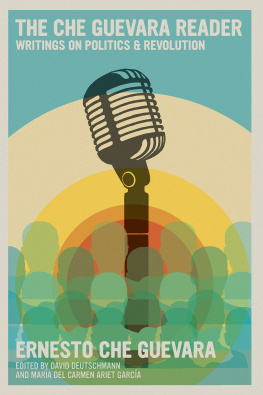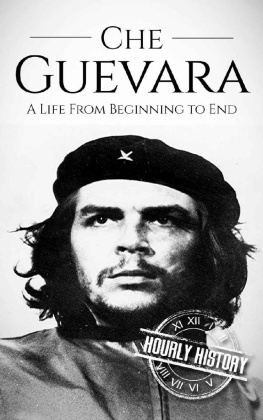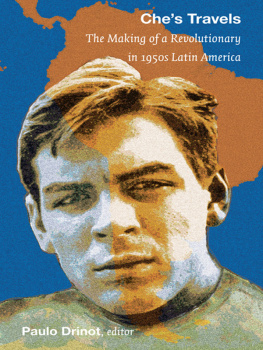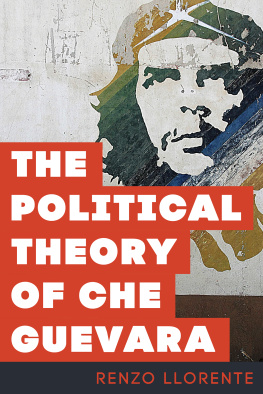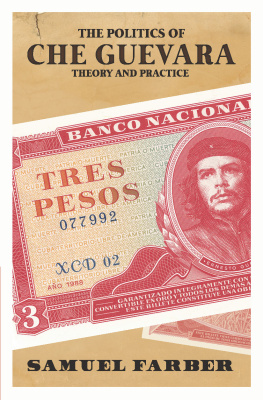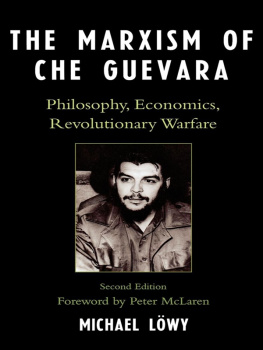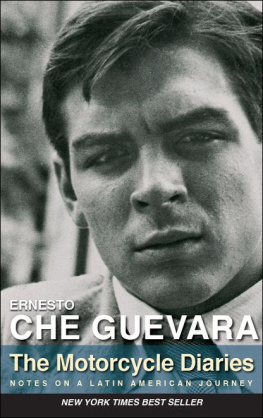CHE GUEVARA READER
Writings on Politics & Revolution
Edited by David Deutschmann and Mara del Carmen Ariet Garca
SEVEN STORIES PRESS
New York Oakland London
Copyright 2013 Ocean Press
Copyright 2013 Che Guevara Studies Center, Havana
Copyright 2013 Aleida March
All photographs 2011 Che Guevara Studies Center, Havana and Aleida March
Published in English by Seven Stories Press, Inc., New York, on behalf of Ocean Press, Melbourne, and the Che Guevara Studies Center, Havana.
All rights reserved. No part of this publication may be reproduced, stored in retrieval system or transmitted in any form by any means, electronic, mechanical, photocopying, recording or otherwise, without the prior permission of the publisher.
Library of Congress Cataloging-in-publication Data
Names: Guevara, Che, 1928-1967 author. | Deutschmann, David, editor. | Ariet, Maria del Carmen, editor.
Title: Che Guevara reader: writings on politics & revolution / edited by David Deutschmann and Maria del Carmen Ariet Garcia.
Other titles: Che Guevara Presente. English
Description: New York: Seven Stories Press, [2022] | "Published in Spanish by Ocean Sur as Che Guevara Presente. " | Includes bibliographical references and index.
Identifiers: LCCN 2022014391 | ISBN 978166211120 (trade paperback) | ISBN 9781644211137 (ebook)
Subjects: LCSH: CubaHistory1933-1959. | CubaPolitics and government1959-1990. | World politics1955-1965. | Guerrilla warfare. | Communism.
Classification: LCC F1787.5 .G75 2022 | DDC 972.9106/3dc23/eng/20220329
LC record available at http://lccn.loc.gov/2022014391
Printed in the USA
Published in Spanish by Ocean Sur as
Che Guevara Presente, ISBN 978-1-64421-141-0 (paper);
ISBN 978-1-64421-114-4 (e-book)
9 8 7 6 5 4 3 2 1
CONTENTS
We are realists... We dream the impossible.
Che Guevara
Ernesto Che Guevara
Ernesto Guevara de la Serna was born in Rosario, Argentina on June 14, 1928. As a medical student in Buenos Aires and after earning his degree as doctor, he traveled throughout Latin America. Living in Guatemala during 1954 then under the elected government of Jacobo Arbenz he became involved in political activity there and was an eyewitness to the overthrow of that government in a CIA-organized military operation.
Forced to leave Guatemala under threat of death, Guevara went to Mexico City. There he linked up with exiled Cuban revolutionaries seeking to overthrow dictator Fulgencio Batista. In July 1955 he met Fidel Castro and immediately enlisted in the guerrilla expedition Castro was organizing. The Cubans nick-named him Che, a popular form of address in Argentina.
From November 25 to December 2, 1956, Guevara was part of the expedition that sailed to Cuba aboard the cabin cruiser Granma to begin the revolutionary armed struggle in the Sierra Maestra mountains. Originally the troop doctor, he became the first Rebel Army commander in July 1957.
In September 1958, Guevara and Camilo Cienfuegos each led guerrilla columns westward from the Sierra Maestra to the center of the island. Through fierce fighting they successfully extended the Rebel Armys operations to much of Cuba. At the end of December 1958, Guevara led the Rebel Army forces to victory in the battle of Santa Clara, one of the decisive engagements of the war.
Following the rebels victory on January 1, 1959, Guevara became a key leader of the new revolutionary government. In September 1959 he began serving as head of the Department of Industry of the National Institute of Agrarian Reform; in November 1959 he became President of the National Bank; and in February 1961 he became Minister of Industry. He was also a central leader of the political organization that in 1965 became the Communist Party of Cuba.
Guevara was a leading Cuban representative around the world, heading numerous delegations and speaking at the United Nations and other international forums.
In April 1965 Guevara left Cuba to participate directly in revolutionary struggles abroad. He spent several months in the Congo in Africa, returning to Cuba secretly in December 1965. In November 1966 he arrived in Bolivia where he led a guerrilla detachment fighting that countrys military dictatorship. Wounded and captured by U.S.-trained and supervised Bolivian counterinsurgency troops on October 8, 1967, he was murdered the following day.
Introduction
T his expanded edition of a book first published in 1997 on the 30th anniversary of Che Guevaras death has a simple purpose: to make available to an English-reading audience a selection of articles, speeches and letters by Ernesto Che Guevara. It is not a biography nor a book of reminiscences by others it is Che Guevara in his own words.
In the almost four decades since his death, the worlds image of Che Guevara has become increasingly distorted and somewhat one-dimensional. The romanticized portrait known to many is that of the individual guerrilla fighter heroic to some, to others an adventurer. His organic connection to the Cuban revolution fades in this picture. His work side by side with Fidel Castro for nearly a decade; his contributions to Marxist theory; his efforts as a government minister in the first years of the new Cuba after the overthrow of the Batista dictatorship; his tireless labor grappling with the problems of guiding the economic development of a backward country besieged and attacked by U.S. imperialism; his championing the interests of the people of Asia, Africa and Latin America all this is missing from most popular portrayals of Che Guevara outside of Cuba.
This is reflected in the fact that for two decades or more after his death his writings were largely unavailable in English. Several collections of speeches by Che were published in the 1960s, but most were long out of print. The 30th anniversary of his death saw several new biographies and many commentaries on his life and death, but still few efforts to publish the ideas of Che himself, in his own words.
This book presents the political lessons drawn by Che Guevara from his experiences and the many tasks that he took on: as Rebel Army commander and strategist of guerrilla warfare; as a leader of the July 26 Movement, which played a central role in the overthrow of the U.S.-backed Batista dictatorship; as head of the National Bank and Ministry of Industry in the new government; as a forger of Cubas close ties with liberation movements throughout the African continent; and as a representative of the Cuban government on platforms throughout the world.
In a speech given before one million people in Havana on October 18, 1967, at a memorial service for Che Guevara, Cubas Fidel Castro placed significant emphasis on the breadth of Guevaras political contribution:
Those who attach significance to the lucky blow that struck Che down try in vain to deny his experience and his capacity as a leader. Che was an extraordinarily able military leader. But when we remember Che, when we think of Che, we do not think fundamentally of his military virtues. No! Warfare is a means and not an end. Warfare is a tool of revolutionaries. The important thing is the revolution. The important thing is the revolutionary cause, revolutionary ideas, revolutionary objectives, revolutionary sentiments, revolutionary virtues!
And it is in that field, in the field of ideas, in the field of sentiments, in the field of revolutionary virtues, in the field of intelligence, that apart from his military virtues we feel the tremendous loss that his death means to the revolutionary movement.

